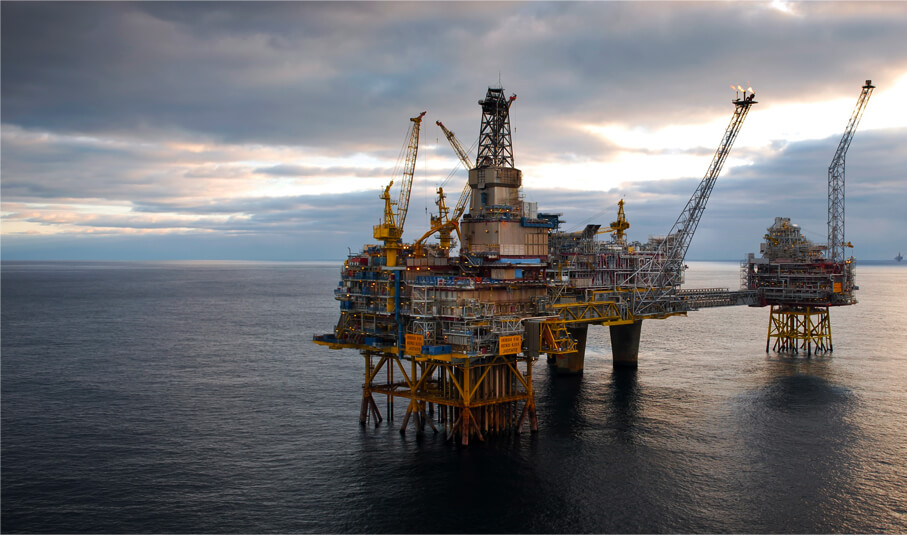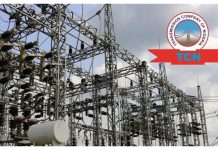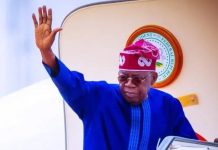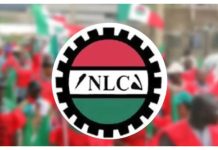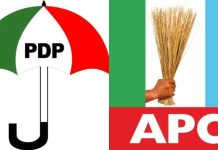Nigeria’s state-owned refinery in Kaduna, a rusted hulk set on about 1.1 square miles on the parched outskirts of the northern city, has the capacity to process 110,000 barrels of oil a day. Last year it processed virtually nothing. The three other state-owned refineries — in the oil-rich Niger delta region in the south of the country — did not do much better. In the year to October, the refineries operated at barely 11 percent of their capacity of 445,000 barrels a day. In October itself, none of the refineries processed any crude, and they operated at a combined loss of $30 million.
The decrepitude of the refineries in Africa’s largest crude producer is not only a reflection of the sorry state of an oil and gas sector starved of investment but also a reminder of the country’s sluggish crude-driven economy. Oil still accounts for as much as 56 percent of state revenues.

The two main candidates facing off to lead Africa’s most populous nation — the election was meant to take place yesterday but was delayed by a week — offer very different choices for reforming this vital industry, between public– or private sector-led development. It highlights a continuing debate in the country for which the term “kleptocracy” was coined in the 1960s over whether corruption is the price Nigeria must pay for growth.
HE MIGHT BE A THIEF, BUT HE NEVER EATS ALONE.
HADIZA MOHAMMED SANI, AN ATIKU ABUBAKAR SUPPORTER, ON THE CANDIDATE
For the incumbent, President Muhammadu Buhari, the issue is personal. He built some of the state refineries as oil minister in the 1970s, and his approach reflects his past as a military dictator: His focus is state-led growth and his plan is to form public-private partnerships to revive the refineries.
In stark contrast Atiku Abubakar, his main rival, plans to sell off the refineries. The 72-year-old made his fortune in the oil and gas business before leading the country’s patchy privatization drive as vice president in the 2000s — a push he promises to revive if he wins. His principal target is the Nigerian National Petroleum Corp. (NNPC), the sprawling state-owned oil company, an epicenter of corruption.
Both want to diversify the oil-dependent economy and boost infrastructure spending, but differ on how to achieve it. For perhaps the first time Nigerian voters have a clear choice between the major candidates based on their polar opposite approaches to the economy and business.
“[Buhari] tends to be a bit more state interventionist, in the sense of trying to use the mechanisms of the state to create outcomes,” says Nonso Obikili, director of the Abuja-based Turgot Centre for Economics and Policy Research. “Atiku’s focus seems to be more market-driven … the focus seems to be let’s create the policy environment and let the private individuals do what they want to do.”
Discussions of economic stewardship in Nigeria are inextricable from those about public corruption. For much of the previous decade, Nigeria’s economy roared along at about 7 percent annual growth. But the number of Nigerians living in poverty also grew, suggesting that the growth was superficial and unproductive, partly fueled by stolen money funding the lavish lifestyles of the politically connected.
Buhari has campaigned explicitly against that era. He was elected in 2015 on an anti-corruption pledge and maintains an aura of incorruptibility even as his anti-graft drive has been harshly criticized as partisan, and has yet to result in a single conviction after four years. The president has shared the stage this campaign with a number of politicians suspected by anti-graft campaigners of corruption. And according to a Gallup poll released in February 84 percent of Nigerians believe government corruption is widespread — down just 2 points from 2014.
Abubakar has also vowed to tackle corruption, but he was vice president for some of those high-flying years in the 2000s — and graft allegations have trailed him ever since. A 2010 U.S. Senate report into how named individuals “circumvent U.S. anti–money laundering and anti-corruption safeguards” alleged that Abubakar’s American wife had helped him move $40 million of “suspect” funds from offshore accounts to the U.S. The investigation’s findings “raise a host of questions about the nature and source” of Abubakar’s wealth, according to the report. He denies any wrongdoing, but his reputation is cemented in the eyes of many voters, supporters and opponents.
At Makarfi Plaza in Kaduna, a few miles from the rusting refinery, Odebunmi Nurudeen, a university graduate who repairs mobile phones, argues with friends about politics.
“They say Atiku is an entrepreneur, but do we really need that?” Nurudeen asks. “How did he make that money? He can privatize NNPC — but he should do it for normal people, not the politicians, not for himself or his friends.
“Before we were living on stolen money — people accepted it because they would get some,” he continues, referring to some of the corruption scandals that emerged during the 16 years Abubakar’s People’s Democratic Party (PDP) ran the country. But, he says, Buhari has turned off the tap.
“The whole thing about privatizing NNPC, you have to look at it with some trepidation when it comes to Atiku,” says Ola Bello, Lagos-based executive director of Good Governance Africa. “The broad consensus is what he oversaw [when he led privatization efforts as vice president] was more consistent with the making of Russian oligarchs than [listing on] Wall Street or the London Stock Exchange.”


